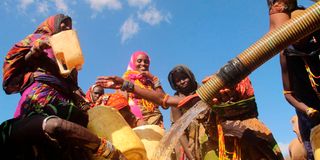After decades without water, Marsabit village gets its first borehole

Women at Manguto Village in North Horr, Marsabit County scramble for water from a water bowser. After years of suffering, Karare village got its first borehole this week.
On a dusty Monday in February 2019, a group of Marsabit leaders attending a meeting at Karare market were shocked when they were served muddy water to quench their thirst.
The dirty water was a protest by local women following years of unfulfilled promises by politicians to end the perennial shortage of domestic water in the area.
The women rejected the day's agenda — a public participation forum on the establishment of Marsabit Municipality — and demanded that access to clean water be discussed.
"Since I was born, we have suffered from lack of water. We used to brave wild animals and walk 10 kilometres into the forest to get clean water in the Marsabit craters. It would take us half a day to get a 20-litre jerry can," said Ms Lucia Loltome, in her late 50s.
Karare has not had fresh drinking water since the settlement was established, and residents rely on seasonal water pans and natural springs deep in the Marsabit National Park.
According to Saku MP Dido Rasso, several attempts by government and NGOs to get groundwater in Karare have failed over the years.
But now Karare has shaken off its thirsty past after the Kenya Drylands Education Fund (KDEF), a local organisation focused on improving education in Marsabit and Samburu, drilled a 520-metre borehole.
KDEF Executive Director Ahmed Kura said it cost Sh25 million to drill one of the deepest boreholes in the country, and install solar panels, storage tanks and automatic water dispensers, and piping to serve more than 1,200 families.
"Karare market had become the destination for all water vendors and was synonymous with long queues of jerry cans throughout the day. Residents had no choice but to buy a 20-litre jerry can for Sh20. As an organisation, we have decided to end this cycle that has impoverished the residents," said Mr Kura during the handover of the borehole on Saturday.
He said the deep groundwater had hampered previous efforts to bring water to Karare, which is about 25 kilometres south of Marsabit town.
The community borehole water will be distributed through vending machines, paid for via M-Pesa.
The money is managed by a borehole committee appointed by the community.
"Each family has been given a token chip which, when tapped on the dispenser, deducts Sh5 and dispenses 20 litres of water. This ensures sustainability as the project funds go directly into their bank account.
Residents can also fetch water whenever they want," said the KDEF founder.
Ms Loltome said the sinking of the borehole in Karare has saved women hours of labour searching for water.
"In the past, we could waste a whole day and risk being attacked by wild animals in search of water. Now we can fetch water closer home and at any time, without having to find someone to open the water kiosk," said Ms Loltome.
The organisation also drilled and equipped a second borehole at St Cavallera Girls Secondary School in Karare at a cost of Sh20 million.
A report by the Kenya National Human Rights Commission, entitled Marsabit County Action Plan for the Realisation of the Rights to Water and Sanitation, 2022, shows that only 15 per cent of households are connected to piped water, while in rural areas, the main sources of water are boreholes, and the water is mostly saline.





